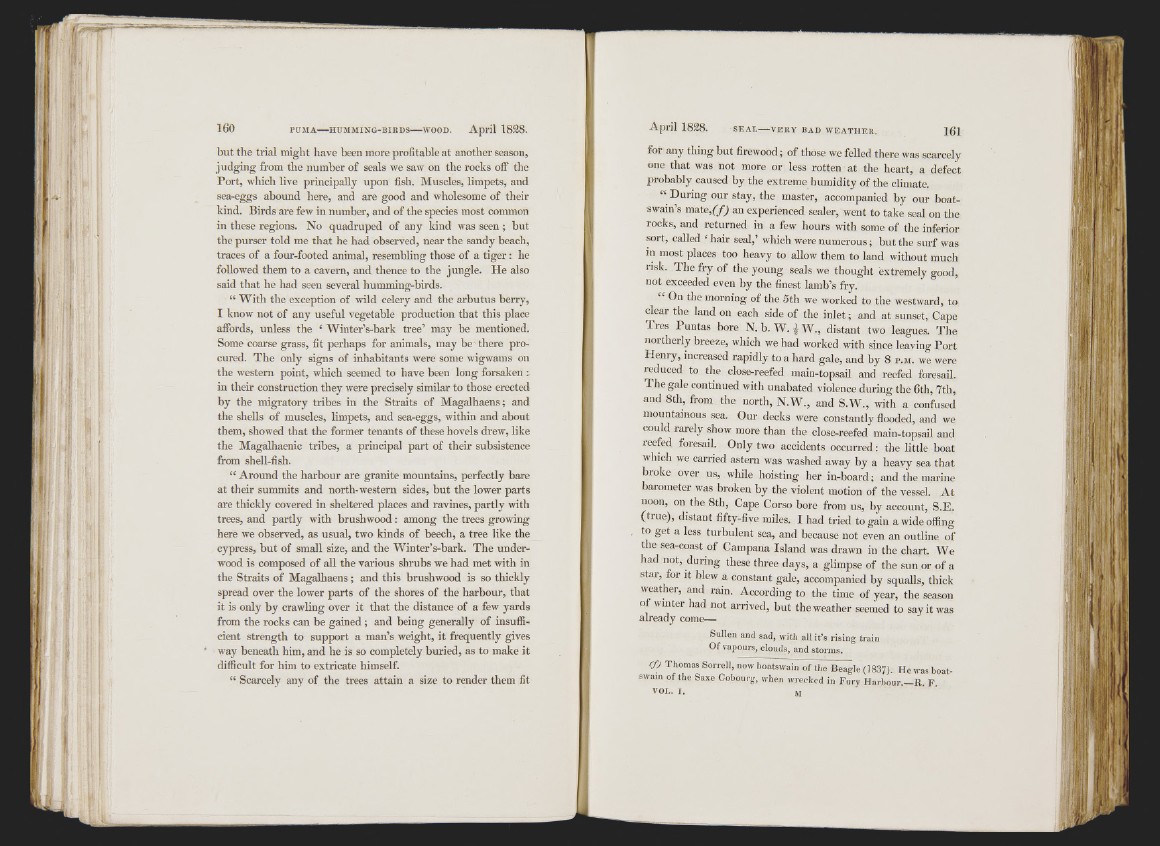
160
but the trial might have been more profitable at another season,
judging from the number of seals we saw on the rocks off the
Port, which live principally upon fish. Muscles, limpets, and
sea-eggs abound here, and are good and wholesome of their
kind. Birds are few in number, and of the species most common
in these regions. No quadruped of any kind was seen ; but
the purser told me that he had observed, near the sandy beach,
traces of a four-footed animal, resembling those of a tiger: he
followed them to a cavern, and thence to the jungle. He also
said that he had seen several humming-birds.
“ With the exception of wild celery and the arbutus berry,
I know not of any useful vegetable production that this place
affords, unless the ‘ WinterVbark tree’ may be mentioned.
Some coarse grass, fit perhaps for animals, may be- there procured.
The only signs of inhabitants were some wigwams on
the western point, which seemed to have been long forsaken :
in their construction they were precisely similar to those erected
by the migratory tribes in the Straits of Magalhaens; and
the shells of muscles, limpets, and sea-eggs, within and about
them, showed that the former tenants of these hovels drew, like
the Magalhaenic tribes, a principal part of their subsistence
from shell-fish.
“ Around the harbour are granite mountains, perfectly bare
at their summits and north-western sides, but the lower parts
are thickly covered in sheltered places and ravines, partly with
trees, and partly with brushwood: among the trees growing
here we observed, as usual, two kinds of beech, a tree like the
cypress, but of small size, and the Winter’s-bark. The underwood
is composed of all the various shrubs we had met with in
the Straits of Magalhaens ; and this brushwood is so thickly
spread over the lower parts of the shores of the harbour, that
it is only by crawling over it that the distance of a few yards
from the rocks can be gained; and being generally of insufficient
strength to support a man’s weight, it frequently gives
way beneath him, and he is so completely buried, as to make it
difficult for him to extricate himself.
“ Scarcely any of the trees attain a size to render them fit
for any thing but firewood; of those we felled there was scarcely
one that was not more or less rotten at the heart, a defect
probably caused by the extreme humidity of the climate.
“ During our stay, the master, accompanied by our boatswain’s
mate,f/J an experienced sealer, went to take seal on the
rocks, and returned in a few hours with some of the inferior
sort, called ‘hair seal,’ which were numerous; but the surf was
in most places too heavy to allow them to land without much
risk. Ih e fry of the young seals we thought extremely good,
not exceeded even by the finest lamb’s fry.
“ On the morning of the 5th we worked to the westward, to
clear the land on each side of the inlet; and at sunset, Cape
Tres Puntas bore N. b. W .) W., distant two leagues. The
northerly breeze, which we had worked with since leaving Port
Henry, increased rapidly to a hard gale, and by 8 p .m . we were
reduced to the close-reefed main-topsail and reefed foresail.
The gale continued with unabated violence during the 6th, 7th,
and 8th, from the north, N.W., and S.W., with a confused
mountainous sea. Our decks were constantly flooded, and we
could rarely show more than the close-reefed main-topsail and
reefed foresail. Only two accidents occurred: the little boat
wliich we carried astern was washed away by a heavy sea that
broke over us, while hoisting her in-board; and the marine
barometer was broken by the violent motion of the vessel. At
noon, on the 8th, Cape Corso bore from us, by account, S.E.
(true), distant fifty-five miles. I had tried to gain a wide offing
to get a less turbulent sea, and because not even an outline of
the sea-coast of Campana Island was drawn in the chart. We
had not, during these three days, a glimpse of the sun or of a
stai, for It blew a constant gale, accompanied by squalls, thick
weather, and rain. According to the time of year, the season
o winter had not arrived, but the weather seemed to say it was
already come—
Sullen and sad, with all it’s rising train
Of vapours, clouds, and storms.
CfJ Thomas Sorrell, now boatsi/afrTofThe Beagle (1837). He was boatswain
of tlie Saxe Cobourg, when wrecked in Fury Harbour —R F
VOL. I . M